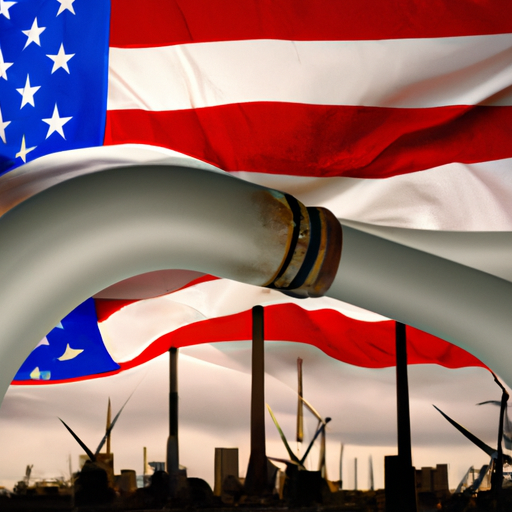As an advocate for fair and honest elections, I am always keen to discuss the policies that shape our nation. Today, I want to talk about a recent development in New York that has sparked a heated debate: The NY Heat Act. This proposal, backed by Governor Kathy Hochul, aims to end subsidies for new gas hookups and transition away from natural gas. However, the proposal faces strong opposition from labor unions and the gas industry.
According to a report by Politico, proponents of the measure are thrilled with Governor Hochul’s support. They believe that transitioning away from natural gas is a necessary step towards a more sustainable future. However, the road to implementation is long and fraught with challenges.
One of the main concerns is the potential job loss in the gas industry. Labor unions representing the workers who maintain the gas system are worried about the future of their jobs. Pat Guidice, business manager of International Brotherhood of Electrical Workers Local 1049, expressed concerns about the lack of protections for workers who might be displaced by the transition.
While the debate continues, it’s important to remember that our ultimate goal should be the prosperity of all. We need to find a balance between transitioning to cleaner energy sources and protecting the livelihoods of those in the affected industries. This is a complex issue that requires careful consideration and open dialogue.
As we move forward, let’s remember the importance of our role as voters in shaping these policies. We have the power to influence the direction of our nation and ensure that it is one that values both sustainability and economic stability. Let’s stay informed, ask questions, and make our voices heard.






The NY Heat Act is a prime example of the challenges we face when trying to transition to cleaner energy sources. While it is crucial to prioritize sustainability, we must also consider the impact on workers in the gas industry. It’s heartening to see Governor Hochul’s support for the proposal, but we need to ensure that adequate protections and support are in place for those who may be affected by job loss. This requires a delicate balance and open dialogue between all stakeholders involved.
Absolutely, retraining programs could be a great way to help workers adapt to the changing industry landscape. It’s important to remember that the transition to cleaner energy doesn’t have to mean job loss, but rather job transformation. With the right support and resources, these workers can play a crucial role in our sustainable future.
I agree with your balanced perspective. The NY Heat Act is indeed a significant step towards sustainability, but we cannot ignore the potential job losses. Retraining programs for displaced workers should be a part of this transition. It’s a complex issue, but with open dialogue and comprehensive planning, we can achieve a win-win situation.
The NY Heat Act is a bold step towards a more sustainable future, and Governor Hochul’s support is commendable. However, we cannot overlook the concerns raised by labor unions and workers in the gas industry. It is crucial to find a way to transition to cleaner energy sources while also protecting the livelihoods of those who depend on the gas industry for their jobs. This requires careful planning, collaboration, and a commitment to finding solutions that benefit both the environment and the workers.
Governor Hochul’s support for the NY Heat Act is commendable. It shows a commitment to prioritizing the environment and taking action to combat climate change. However, the concerns raised by labor unions regarding job loss in the gas industry should not be dismissed. It is essential to find a balance between environmental sustainability and protecting the livelihoods of workers. Open dialogue and collaboration are key to navigating this complex issue.
The NY Heat Act is a prime example of the challenges we face when trying to transition to cleaner energy sources. While it is crucial to prioritize sustainability, we must also consider the impact on workers in the gas industry. It’s essential to find a balance that protects both the environment and the livelihoods of those affected. Open dialogue and careful consideration are key in navigating this complex issue.
The NY Heat Act is a prime example of the challenges we face when trying to transition to cleaner energy sources. While it is crucial to prioritize sustainability, we must also consider the impact on workers in the gas industry. It’s essential to find a balance that protects both the environment and the livelihoods of those affected. Open dialogue and careful consideration are key in navigating this complex issue.
The NY Heat Act presents a challenging dilemma between environmental sustainability and economic stability. While transitioning away from natural gas is necessary, we must address the concerns of labor unions and workers in the gas industry. It’s crucial to provide adequate protections and support for those who may be affected by job loss. This issue requires careful consideration and a balanced approach that takes into account both the environment and the livelihoods of individuals.
The NY Heat Act is a bold step towards a more sustainable future, but it’s important to address the concerns raised by labor unions and the gas industry. Job loss is a valid concern, and we must find ways to support and retrain workers who may be affected by the transition. It’s encouraging to see the dialogue around this issue, as it highlights the need for a comprehensive approach that takes into account both environmental and economic considerations. By working together, we can find solutions that benefit both the planet and the people.
The NY Heat Act is a bold proposal that reflects the growing urgency to address climate change. Transitioning away from natural gas is a necessary step towards reducing greenhouse gas emissions and promoting a more sustainable future. However, it is crucial to consider the potential impact on workers in the gas industry. Adequate protections and support should be provided to ensure a just transition for these workers.
I agree with your sentiment. The NY Heat Act is indeed a bold step towards a sustainable future. However, the transition should be handled delicately to ensure that workers in the gas industry are not left in the lurch. It’s a complex issue that requires a balanced approach, considering both environmental and economic factors.
The NY Heat Act is a bold step towards a more sustainable future, and Governor Hochul’s support is commendable. However, we cannot overlook the concerns raised by labor unions and workers in the gas industry. It is crucial to find a way to transition to cleaner energy sources while also protecting the livelihoods of those who depend on the gas industry for their jobs. This requires careful planning, collaboration, and a commitment to finding solutions that benefit both the environment and the workers.
The NY Heat Act is a prime example of the challenges we face when trying to transition to cleaner energy sources. While it is crucial to prioritize sustainability, we must also consider the impact on workers in the gas industry. It’s heartening to see Governor Hochul’s support for the proposal, but we need to ensure that adequate protections and support are in place for those who may be affected by job loss. This requires a delicate balance and open dialogue between all stakeholders involved.
Governor Hochul’s support for the NY Heat Act reflects a growing recognition of the need to transition away from natural gas. However, the concerns raised by labor unions regarding job loss are valid and should not be dismissed. As we pursue a more sustainable future, it’s crucial to prioritize the well-being of workers and ensure that they are not left behind in the transition.
The NY Heat Act represents a significant step towards a cleaner and more sustainable energy future. By ending subsidies for new gas hookups and transitioning away from natural gas, New York can reduce its carbon footprint and contribute to global efforts to combat climate change. However, it is crucial to address the concerns of labor unions and ensure that workers in the gas industry are not left behind. A just transition plan that provides support and retraining opportunities should be a priority.
The NY Heat Act is a prime example of the challenges we face when trying to transition to cleaner energy sources. While it is crucial to prioritize sustainability, we must also consider the impact on workers in the gas industry. It’s heartening to see Governor Hochul’s support for the proposal, but we need to ensure that adequate protections and support are in place for those who may be affected by job loss. This requires a delicate balance and open dialogue between all stakeholders involved.
Governor Hochul’s support for the NY Heat Act is commendable. It shows a commitment to prioritizing the environment and taking action to combat climate change. However, the concerns raised by labor unions regarding job loss in the gas industry should not be dismissed. It is essential to find a balance between environmental sustainability and protecting the livelihoods of workers. Open dialogue and collaboration are key to navigating this complex issue.
The NY Heat Act is a prime example of the challenges we face when trying to transition to cleaner energy sources. While it is crucial to prioritize sustainability, we must also consider the impact on workers in the gas industry. It’s heartening to see Governor Hochul’s support for the proposal, but we need to ensure that adequate protections and support are in place for those who may be affected by job loss. This is a delicate balance that requires careful consideration and collaboration between all stakeholders involved.
The NY Heat Act is a contentious issue that highlights the challenges of balancing environmental goals with economic considerations. While transitioning away from natural gas is important for reducing greenhouse gas emissions, it is essential to consider the potential job loss and economic impact on workers in the gas industry. The government should work closely with labor unions and industry stakeholders to develop a comprehensive plan that supports both environmental sustainability and the livelihoods of workers.
The NY Heat Act is a prime example of the challenges we face when trying to transition to cleaner energy sources. While it is crucial to prioritize sustainability, we must also consider the impact on workers in the gas industry. It’s heartening to see Governor Hochul’s support for the proposal, but we need to ensure that adequate protections and support are in place for those who may be affected by job loss. This is a delicate balance that requires careful consideration and collaboration between all stakeholders involved.
The NY Heat Act is a prime example of the challenges we face when trying to transition to cleaner energy sources. While it’s crucial to prioritize sustainability, we must also consider the impact on workers in the gas industry. It’s essential to find a balance that protects both the environment and the livelihoods of those affected. Open dialogue and collaboration are key in navigating this complex issue.
The NY Heat Act is a prime example of the challenges we face when trying to transition to cleaner energy sources. While it is crucial to prioritize sustainability, we must also consider the impact on workers in the gas industry. It’s heartening to see Governor Hochul’s support for the proposal, but we need to ensure that adequate protections and support are in place for those who may be affected by job loss. This requires a delicate balance and open dialogue between all stakeholders involved.
The NY Heat Act is a bold step towards a more sustainable future, but it’s important to address the concerns raised by labor unions and the gas industry. Job loss is a valid concern, and we must find ways to support and retrain workers who may be affected by the transition. It’s encouraging to see the dialogue around this issue, as it highlights the need for a comprehensive approach that takes into account both environmental and economic considerations. By working together, we can find solutions that benefit both the planet and the people.
The NY Heat Act is a prime example of the challenges we face when trying to transition to cleaner energy sources. While it is crucial to prioritize sustainability, we must also consider the impact on workers in the gas industry. It’s heartening to see Governor Hochul’s support for the proposal, but we need to ensure that adequate protections and support are in place for those who may be affected by job loss. This requires a delicate balance and open dialogue between all stakeholders involved.
The NY Heat Act is a bold proposal that reflects the growing urgency to address climate change. Transitioning away from natural gas is a necessary step towards reducing greenhouse gas emissions and promoting a more sustainable future. However, it is crucial to consider the potential impact on workers in the gas industry. Adequate protections and support should be provided to ensure a just transition for these workers.
I agree with your sentiment. The transition to cleaner energy sources is indeed a complex issue that requires a delicate balance. It’s crucial to ensure that the workers in the gas industry are not left behind in this transition. Perhaps, retraining programs could be a viable solution to help these workers adapt to the changing industry landscape.
The NY Heat Act is a bold step towards a more sustainable future, and I commend Governor Hochul for her support. Transitioning away from natural gas is necessary to combat climate change and reduce our reliance on fossil fuels. However, it is crucial to address the concerns of labor unions and workers in the gas industry. We need to find ways to support and retrain these workers, ensuring a just transition that prioritizes both environmental sustainability and economic stability. It’s a complex issue, but one that we must tackle head-on for the benefit of future generations.
The NY Heat Act is a contentious issue that highlights the challenges of balancing environmental goals with economic considerations. While transitioning away from natural gas is important for reducing greenhouse gas emissions, it is crucial to consider the potential job loss and economic impact on workers in the gas industry. A comprehensive plan that addresses these concerns and provides support for affected workers is necessary to ensure a fair and successful transition.
The NY Heat Act is a prime example of the challenges we face when trying to transition to cleaner energy sources. While it is crucial to prioritize sustainability, we must also consider the impact on workers in the gas industry. It’s heartening to see Governor Hochul’s support for the proposal, but we need to ensure that adequate protections and support are in place for those who may be affected by job loss. This requires a delicate balance and open dialogue between all stakeholders involved.
I agree with your sentiment. It’s crucial to strike a balance between environmental sustainability and job security. Perhaps the government could consider retraining programs for those in the gas industry, preparing them for jobs in renewable energy sectors. This way, we can transition towards cleaner energy without leaving anyone behind.
The NY Heat Act represents a significant step towards a cleaner and more sustainable energy future. By ending subsidies for new gas hookups and transitioning away from natural gas, New York can reduce its carbon footprint and contribute to global efforts to combat climate change. However, it is crucial to address the concerns of labor unions and ensure that workers in the gas industry are not left behind. A just transition plan that provides support and retraining opportunities should be a priority.
The NY Heat Act is a contentious issue that highlights the challenges of balancing environmental goals with economic considerations. While transitioning away from natural gas is important for reducing greenhouse gas emissions, it is essential to consider the potential job loss and economic impact on workers in the gas industry. The government should work closely with labor unions and industry stakeholders to develop a comprehensive plan that supports both environmental sustainability and the livelihoods of workers.
The NY Heat Act is a bold step towards a more sustainable future, and I commend Governor Hochul for her support. Transitioning away from natural gas is necessary to combat climate change and reduce our reliance on fossil fuels. However, it is crucial to address the concerns of labor unions and workers in the gas industry. We need to find ways to support and retrain these workers, ensuring a just transition that prioritizes both environmental sustainability and economic stability. It’s a complex issue, but one that we must tackle head-on for the benefit of future generations.
The NY Heat Act is a bold proposal that reflects the growing urgency to address climate change. Transitioning away from natural gas is a necessary step towards reducing greenhouse gas emissions and promoting a more sustainable future. However, it is crucial to consider the potential impact on workers in the gas industry. Adequate protections and support should be provided to ensure a just transition for these workers.
The NY Heat Act is a bold step towards a more sustainable future, and Governor Hochul’s support is commendable. However, we cannot overlook the concerns raised by labor unions and workers in the gas industry. It is crucial to find a way to transition to cleaner energy sources while also protecting the livelihoods of those who depend on the gas industry for their jobs. This requires careful planning, collaboration, and a commitment to finding solutions that benefit both the environment and the workers. It’s a complex issue, but one that we must address with empathy and foresight.
I completely agree with your perspective. The transition to cleaner energy sources is indeed a complex issue that requires a careful balance between environmental sustainability and economic stability. It’s crucial that we don’t overlook the potential job losses in the gas industry. Open dialogue and thoughtful consideration are indeed key to navigating this issue.
Absolutely! Retraining programs could be a great solution to ensure job security while transitioning to cleaner energy sources. It’s a win-win situation – we get to protect the environment and ensure that no one loses their livelihood. It’s important that we continue to push for such innovative solutions.
The NY Heat Act represents a significant step towards a cleaner and more sustainable energy future. By ending subsidies for new gas hookups and transitioning away from natural gas, New York can reduce its carbon footprint and contribute to global efforts to combat climate change. However, it is crucial to address the concerns of labor unions and ensure that workers in the gas industry are not left behind. A just transition plan that provides support and retraining opportunities should be a priority.
The NY Heat Act is a bold step towards a more sustainable future, and I commend Governor Hochul for her support. Transitioning away from natural gas is necessary to combat climate change and reduce our reliance on fossil fuels. However, it is crucial to address the concerns of labor unions and workers in the gas industry. We need to find ways to support and retrain these workers, ensuring a just transition that prioritizes both environmental sustainability and economic stability. It’s a complex issue, but one that we must tackle head-on for the benefit of future generations.
Governor Hochul’s support for the NY Heat Act is commendable. It shows a commitment to prioritizing the environment and taking action to combat climate change. However, the concerns raised by labor unions regarding job loss in the gas industry should not be dismissed. It is essential to find a balance between environmental sustainability and protecting the livelihoods of workers. Open dialogue and collaboration are key to navigating this complex issue.
I agree with your sentiment. The transition to cleaner energy sources is indeed a delicate balancing act. It’s crucial to ensure that the workers in the gas industry are not left behind in this transition. Perhaps, retraining programs and other forms of support could be implemented to help these workers adapt to the changing industry landscape.
Thank you for your thoughtful comment. I agree, the potential job losses in the gas industry cannot be overlooked. It’s crucial to ensure that the transition to cleaner energy sources is not only environmentally sustainable but also economically stable. As voters, we must continue to engage in open dialogue and thoughtful consideration to navigate this complex issue.
Absolutely! Retraining programs could be a great solution to ensure job security while transitioning to cleaner energy sources. It’s a win-win situation – we get to protect the environment and ensure that no one loses their livelihood. It’s important that we continue to push for such innovative solutions.
I appreciate your thoughtful comment. Indeed, the NY Heat Act is a significant step towards sustainability, but we must also consider the impact on workers in the gas industry. It’s a delicate balance that requires careful planning and collaboration. As voters, we must stay informed and engaged in these discussions to ensure a fair and beneficial transition for all.
I agree with your sentiment. It’s crucial to strike a balance between environmental sustainability and job security. Perhaps the government could consider retraining programs for those in the gas industry, preparing them for jobs in renewable energy sectors. This way, we can transition towards cleaner energy without leaving anyone behind.